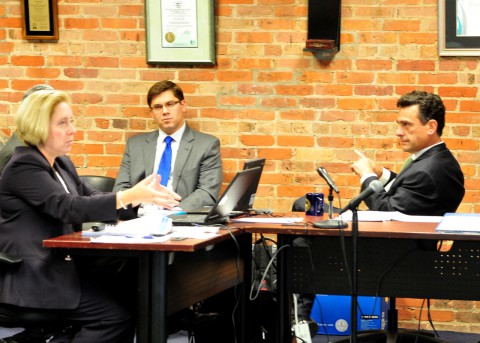“What could be better than using waste to generate the energy we need and saving money in the process?”


“What could be better than using waste to generate the energy we need and saving money in the process?”

Many more millions of gallons of sewage might have flowed into the French Broad River on April 30, but the Metropolitan Sewerage District’s “code red” team — staffers Mark Ferris, Mike Ball, Bob Triplett, Grady Brooks — had not voluntarily plunged into the pool of raw sewage surrounding the pumps to find the missing closure plate and shut off the culprit valve. (Photos by Max Cooper)
A notice of violation has been issued to the Metropolitan Sewerage District of Buncombe County by the N.C. Division of Water Quality, pertaining to the April 30 spill of raw sewerage into the French Broad River. The overflow of almost 6 million gallons was the result of a pump accident during a construction operation at the plant, resulting in the shutdown of its main pumps.
Passing a new budget resolution and agreeing to hire additional legal counsel were the two top items at the May 15 meeting of the board of the Metropolitan Sewerage District of Buncombe County. The preliminary budget for the public agency, totaling roughly $40 million, includes a 2.5 percent rate increase for domestic users, a $16.7 […]
Passing a new budget resolution and agreeing to hire additional legal counsel were the two top items at Wednesday’s meeting of the board of the Metropolitan Sewerage District of Buncombe County. The $40-million budget reflects a $16.7 million capital improvement investment and a 2.5 percent rate increase for domestic users.

After millions of gallons of raw sewage spilled into the French Broad River last week, RiverLink saw an educational opportunity surface. The nonprofit will host a tour of MSD’s wastewater treatment plant June 4 at 10 a.m. (Pictured: French Broad River Academy students visit the RiverLink office to learn about the urban water cycle, the focus of the upcoming tour. (Photo courtesy of RiverLink)
As Asheville gears up to file a lawsuit against state legislation that gives control of the city’s water system to the Metropolitan Sewage District, some rejected ideas posed by Buncombe County years ago to provide compensation have resurfaced.
With two weeks left before the North Carolina General Assembly’s May 16 crossover deadline, Asheville-specific legislation remains in focus among the more than 1,700 bills and resolutions entered in the 2013 session. And everything must now compete for time with the nearly $50 billion budget recently proposed by Gov. Pat McCrory.
A seemingly straightforward meeting of the board of the Metropolitan Sewerage District of Buncombe County took two surprising turns on Wednesday afternoon. One led to a staff report on a private sewer-line failure that took more than two years to resolve. The other led to a vote on withdrawing a December proposal to the city of Asheville regarding the possible merger of water and sewer management — an action that was rejected. UPDATED THURSDAY, APRIL 18.
The hefty final version of an impact study assessing the potential merger of Asheville’s water system with the Metropolitan Sewerage District of Buncombe County was presented to the MSD board on Wednesday. The short version: potential net savings to water customers of $1.1 to $2.2 million per year over the next nine years.
The most-viewed news at mountainx.com this past week: A roundup of Asheville City Council’s Dec. 11 actions, which included approving pub cycles and reviewing the city’s study of the possible merger of the water system with the Metropolitan Sewerage District.
A proposed compensation settlement of $57 million by the Metropolitan Sewerage District of Buncombe County for the proposed Asheville water system merger was officially endorsed on Friday by the MSD board’s planning committee, and moves to the full board on December 12.
The Metropolitan Sewerage District has proposed a $57 million compensation deal as part of a possible merger with the city of Asheville’s water system. More about what’s in the deal, and what it might mean.
After the Thanksgiving holiday and Black Friday shopping frenzies, the city’s own august governing body is back at it on Nov. 27, as Asheville City Council discusses a possible water-system merger, greenway development, and more.

Yesterday, consultants from Arcadis hired by the Metropolitan Sewerage District unveiled their first report on the possible impacts of merging the city of Asheville’s water system. Here are five important conclusions from the over-200 page document. (photo by Bill Rhodes)
Live Twitter coverage of the Metropolitan Sewerage District presenting its plan for a merger with the city of Asheville’s water system, beginning at noon.
Release of a draft economic-impact study of the potential merger of the Asheville water system with the Metropolitan Sewerage District of Buncombe County is expected next week.
Due to the far-reaching effects of Hurricane Sandy, the planned November 1 discussion of the draft water study contracted for by the Metropolitan Sewerage District of Buncombe County has been delayed.
While there was no formal action taken, the board of the Metropolitan Sewerage District has reviewed what were called “underlying assumptions” used by staff in studying the proposed merger of the Asheville water system with MSD’s operation. The option of leasing the approximately 20,000 acres of protected watershed, leaving ownership in the hands of the city, was one item on that list of eight.
Only two legislators made it to the Asheville City Council discussion session Tuesday afternoon, held specifically to dialogue with the local delegation concerning the proposed merger of Asheville’s water system with the Buncombe County Metropolitan Sewerage District. But those present – council members and legislators – did manage to get a few things off their chests.

On May 4, 2011, freshman state Rep. Tim Moffitt of Buncombe County filed a brief bill calling for the transfer of Asheville’s water system to the Metropolitan Sewerage District. Although the bill didn’t mention the city by name, its language pointed directly to Asheville and Buncombe County. The move sparked a firestorm of protest — […]